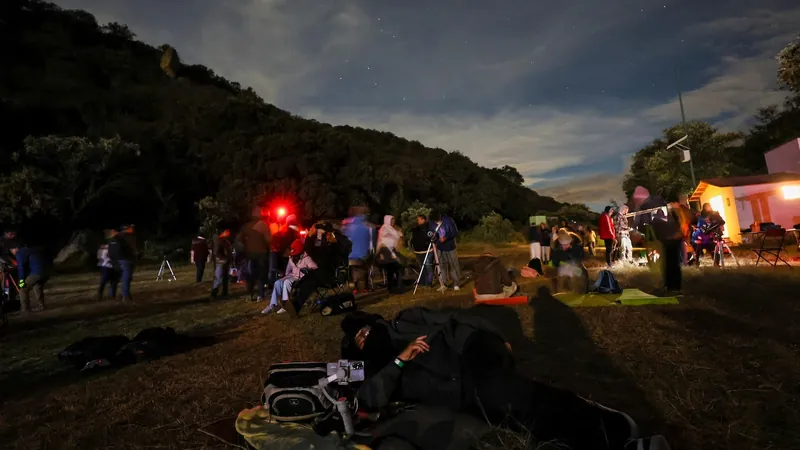
Citizen Astronomers Unite to Safeguard Mexico's Night Sky for Future Generations
2024-10-25
Author: Nur
The Night Sky and Community Efforts
As darkness enveloped Joya-La Barreta Ecological Park, nestled just outside the central Mexican city of Queretaro, the evening air pulsated with the chorus of croaking frogs. One by one, stars began to punctuate the night sky, forming constellations that have fascinated humanity for centuries.
Juan Carlos Hernández, a passionate amateur astronomer, adjusted a large telescope with precision and called out to his friend, Ricardo Soriano, who was guiding the audience's attention toward the clouds with a green laser. Together, they were preparing to catch a glimpse of the Tsuchinshan-Atlas comet—a celestial event drawing enthusiasts from near and far.
Last year, Hernández and his fellow stargazers achieved a remarkable milestone by certifying Joya-La Barreta Ecological Park as the first urban Dark Sky space in Latin America. This prestigious status is awarded by DarkSky International, a non-profit organization dedicated to mitigating the negative impacts of light pollution and promoting awareness about the beauty of the natural night sky.
Importance and Challenges of Dark Sky Status
Perched at an impressive altitude of 8,520 feet (2,600 meters), Joya-La Barreta offers an unspoiled view of the cosmos. Although there are over 200 designated dark sky locations globally, this park stands out as one of only 11 located in urban areas. Unfortunately, its status is increasingly jeopardized by encroaching urbanization and rising light pollution levels.
Hernández, who has been advocating for the preservation of the night sky for more than two decades, is deeply aware of what has been lost. A qualified aerospace engineer by day, he reminisces about the celestial wonders visible from Queretaro just a few years ago. 'In 2014, you could easily see Omega Centauri shimmering above the city,' he lamented. 'Now, it feels like a distant memory.'
Recent research has revealed a startling trend: light pollution is intensifying at an alarming rate, with the world's nighttime brightness increasing by approximately 10% every year. By 2016, more than 80% of the global population was living under light-polluted skies—a stark reminder of humanity's impact on the environment.
Impact on Ecosystem and Community Awareness
In Mexico, studies indicate that as cities expand, the demand for artificial lighting—often justified by safety concerns—has worsened this problem. Fernando Ávila Castro from the National Autonomous University of Mexico likens light pollution to noise pollution, suggesting that excessive artificial light disrupts the natural circadian rhythms of all living organisms.
In addition to interfering with human sleep patterns, light pollution can have detrimental effects on local fauna and flora as well. It alters essential behaviors: when creatures venture out for food, plants undergo reproduction, and migratory patterns shift—transitioning from nighttime reliance on the moonlight to artificial illumination.
Biodiversity and the Role of Community
With a rich biodiversity, Joya-La Barreta park is home to 123 vertebrate species. 'Underneath this magnificent sky, we can hear the sounds of all the wildlife thriving here,' said Analette Casazza, president of another local astronomy association. 'Many of these vital pollinators are nocturnal, showcasing just how crucial this ecosystem is.'
To ensure the protection of this precious resource, community members and officials are joining forces. 'The real challenge is mobilizing citizens,' stated María Guadalupe Espinosa de los Reyes Ayala, Queretaro's environment secretary. 'Once they understand what they have in places like this, they will recognize the need for conservation.'
Ongoing Conservation Efforts
Despite their relentless efforts, Hernández and fellow activists face hurdles. They continue to advocate for the enforcement of Mexico's General Law of Ecological Balance, aimed at curtailing light pollution—an initiative that has seen progress in states like Sonora and Baja California, but remains unsupportively stagnant in Queretaro.
In a concerted effort to maintain their dark sky certification, Hernández and others must submit regular pollution reports to DarkSky. The looming threat of losing this status weighs heavily on the group. 'If light contamination increases and governmental support dwindles, we might be forced to relocate,' warned Ricardo Soriano, another founder of the stargazing agency Astronite. 'It's vital for our community to recognize the importance of preserving this for both education and enjoyment.'
A Night to Remember
On a particular night, as the much-anticipated comet came into focus, a 10-year-old boy named Matti González gazed through the telescope, his parents beaming with pride. 'What do you want to be for Halloween?' asked his father, to which Matti enthusiastically replied, 'An astronaut!'
During this celestial gathering, Hernández energetically moved between guests, illuminating them with his red headlamp, sharing insights into the wonders of the universe, including the intricacies of Saturn's rings. Reflecting on the profound connection to our cosmic origins, he echoed the words of the late astronomer Carl Sagan, illustrating how our very existence ties back to the stars.
'Viewing the sky is the most spiritual experience imaginable,' Hernández expressed with fervor. 'It connects us to our cosmic destiny.' His ultimate hope? That future generations will not take their celestial heritage for granted, as they risk witnessing the loss of a natural marvel that their ancestors cherished.

 Brasil (PT)
Brasil (PT)
 Canada (EN)
Canada (EN)
 Chile (ES)
Chile (ES)
 España (ES)
España (ES)
 France (FR)
France (FR)
 Hong Kong (EN)
Hong Kong (EN)
 Italia (IT)
Italia (IT)
 日本 (JA)
日本 (JA)
 Magyarország (HU)
Magyarország (HU)
 Norge (NO)
Norge (NO)
 Polska (PL)
Polska (PL)
 Schweiz (DE)
Schweiz (DE)
 Singapore (EN)
Singapore (EN)
 Sverige (SV)
Sverige (SV)
 Suomi (FI)
Suomi (FI)
 Türkiye (TR)
Türkiye (TR)